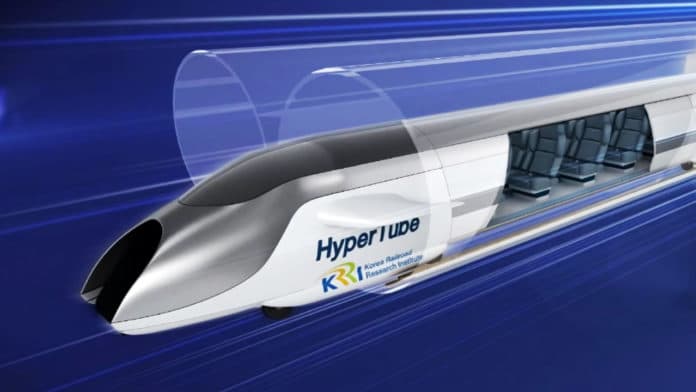The Korean Railroad Research Institute (KORAIL) announced that its Hyper-Tube train achieved a speed of over 621 mph (1,000 km/h) during a test. This marks a major achievement in the race to create the world’s fastest train system.
Hyper-tube is South Korea’s version of the hyperloop. The country has been working on the Hyper Tube project since 2017. Last September, the concept has achieved 443 mph (714 km/h) in a full-fledged aerodynamic test in sub-vacuum condition. But according to KORAIL, they have now solved the problems with the friction created by rapid acceleration.
The team has developed new transportation technology that overcomes the speed limit caused by air and friction resistance of the existing high-speed railroad. Thanks to this, during a recent aerodynamic test, the model train reached a speed of 633 mph (1,019 km/h) at a pressure level of 0.001, which is close to a vacuum.
When compared to aircraft, for example, regular international flights from Europe to Asia fly at speeds of about 497 to 621 mph (800 to 1,000 km/h). You could say hyper-tube is a very fast train.
The institute is continuing to refine its technology and is moving towards the track and full-scale vehicle development by 2022. South Korea hopes to launch the first such hyperloop flight in 2024, reducing travel time from 3.5-hour to 30 minutes between Seoul and South Korea’s second-largest city, Busan. The country already has high-speed trains running on the same route, but the government is working to make this flight much more supersonic as soon as possible.
KORAIL is not the only agency working on such trains. The aforementioned revolutionary technology was first proposed by Elon Musk, the founder of the space company SpaceX, in 2013. Since then, several companies and startups have taken on the challenge, with the most promising being Hyperloop TT and Virgin Hyperloop.
There are, of course, risks of traveling at such high speeds enclosed in a pipe. But perhaps KORAIL’s confidence in the concept has increased now that Virgin Hyperloop has completed its first manned test. Recently, two people rode along the company’s 500-meter test track in Nevada, reaching a speed of 100 mph (160 km/h) – which is significantly slower than Virgin Hyperloop’s theoretical maximum speed of 760 mph (1223 km/h).
